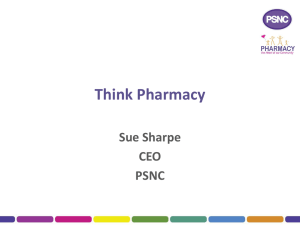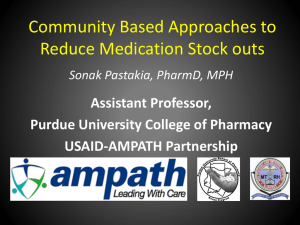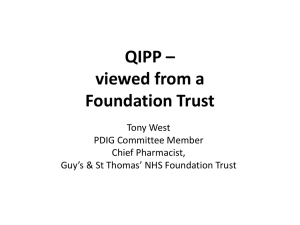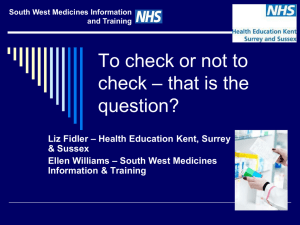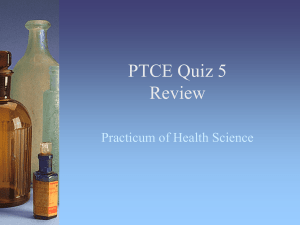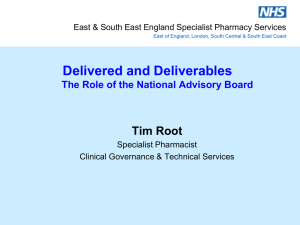The vision for NHS Community Pharmacies
advertisement
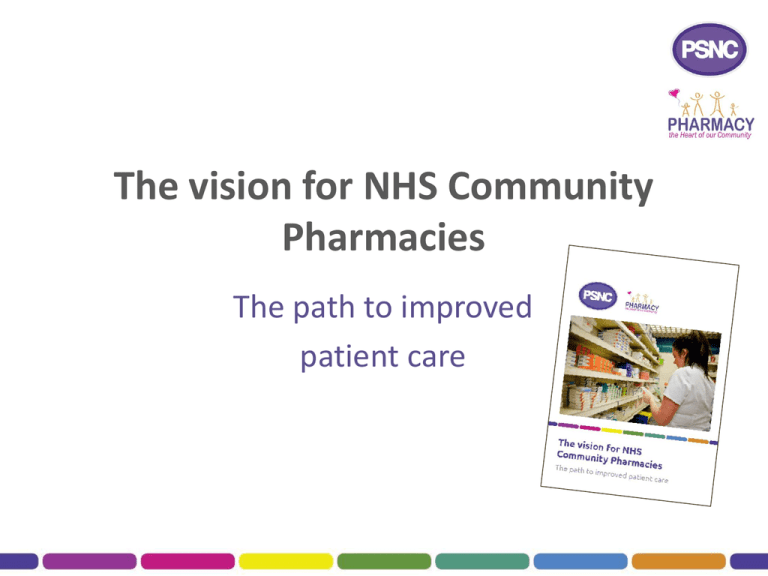
The vision for NHS Community Pharmacies The path to improved patient care PSNC’s vision • Agreed in 2011 and updated in 2012 • Confirmed via a survey of contractors in 2012 (98% of respondents agreed) • Narrative on the Vision published in August 2013 – describes how services could be commissioned over the next few years – written with everyday practice in mind – intended to give pharmacy teams a clear idea of how services could develop in their pharmacies – being used as part of PSNC’s ongoing discussions with NHS England and other commissioners A Vision for 2016 Our aims and aspirations for the NHS community pharmacy service: The community pharmacy service in 2016 will offer support to our communities, helping people to optimise use of medicines to support their health and care for acute and long-term conditions, and providing individualised information, advice and assistance to support the public’s health and healthy living. A Vision for 2016 • All pharmacies will provide a cost-effective and high quality range of services to their patients, encouraged by funding arrangements that motivate service provision, reward positive patient outcomes and offer sustainability to contractors • The value of pharmacy services to patients and the NHS and the wider savings which can be created by the effective use of pharmacy will be evidenced A Vision for 2016 • Pharmacies will be fully integrated into provision of primary care and public health services, and will have a substantial and acknowledged role in the delivery of accessible care at the heart of their community • Pharmacies will be able to deliver a wide range of NHS services to support their customers and patients, and be able to offer them services on equal terms to other primary care providers A Vision for 2016 • Patients will be confident that when they access services from a pharmacy, the pharmacist and other members of the pharmacy team will have the skills and resources necessary to deliver high quality services • Effective communications will ensure seamless integration with other NHS care providers • In some cases arrangements for provision of pharmacy services may include patient registration. All patients will have a free and unfettered choice of pharmacy Four domains of services Optimising the use of medicines Supporting people to live healthier lives/public health Supporting people to self-care Supporting people to live independently The Third Pillar – supporting future NHS provision Optimising the use of medicines Supporting people to self-care Supporting people to live healthier lives/public health Supporting people to live independently Community Pharmacy GP led primary care Hospitals Context and Commissioning • Transfer of service provision from secondary care to primary care is required • GP teams are likely to take on a wider role as the care coordinator for many patients • This is likely to drive demand to free up capacity in general practice to be re-deployed to this new service provision Context and Commissioning • Community pharmacy can provide some services currently provided by general practice, e.g. management of certain LTCs in partnership with GPs • This creates capacity in general practice to take on more work from secondary care • To happen this requires review of secondary care funding flows (PbR) • National approach to commissioning maximises the value community pharmacy can deliver 1. Optimising the use of medicines • Dispensing and repeat dispensing • NHS Medicines Use Reviews – 2.8m provided in 2012/13 • NHS New Medicine Service • Safe disposal of unwanted medicines • The Vision narratives describes how this could develop… Iterative approach to medicines optimisation service developments Addition of elements to the Dispensing service, e.g. STOPP indicators All pharmacies provide episodic MURs and NMS to all patients within defined cohort Start Current time – NMS and targeted MURs The different stages of service development may co-exist New service to specific patient cohorts providing longitudinal medicines optimisation support, building on MUR and NMS Management of single LTC, e.g. asthma, in partnership with patients and GP practice Finish Community pharmacy providing medicines optimisation support for all LTC patients and managing certain conditions in partnership with patients and GP practice 2. Supporting people to self-care • Self-care advice – Self-limiting conditions – Long-term conditions • Signposting to other providers • Sales of over the counter medicines • Minor ailment services 3. Supporting people to live healthier lives • Advice on healthy lifestyle issues as part of NHS services (e.g. MUR and dispensing) • Six public health campaigns per year • And a range of locally commissioned services… 3. Supporting people to live healthier lives • • • • • • • • Stop Smoking support Alcohol screening and support NHS Health Checks Weight management services Emergency contraception / Contraception Chlamydia / Gonorrhoea / Hep B / HIV testing Immunisation – flu, travel health, HPV etc. Substance misuse – needle exchange and supervision of consumption of substitute medicines • Early detection of cancer 3. Supporting people to live healthier lives • Could some public health services be commissioned nationally? e.g. EHC • Healthy Living Pharmacy concept – Structured support team training for health and wellbeing advice – Key services and advice delivered – Public health campaigns – Positive results from evaluation 4. Supporting people to live independently In addition to support to optimise the use of medicines… • Support with re-ordering repeat medicines / the NHS repeat dispensing service • Home delivery of medicines to the housebound • Appropriate provision of multi-compartment compliance aids and other interventions such as reminder charts to help people remember to take their medicines 4. Supporting people to live independently • Reablement services following discharge from hospital • Falls assessment / reduction services • Supply of daily living aids • Identifying emerging problems with peoples’ health • Signposting patients or their carers to additional support and resources related to their condition or situation Our work to achieve this • Working with DH and NHS England to agree a multiyear funding settlement based on the cost of service inquiry • Developing recognition of the value of the community pharmacy service now and in the future amongst the new commissioners • Working to develop models for service delivery in the four domains • Supporting LPCs to operate as effective local voices for pharmacy in the new commissioning environment Q&A
